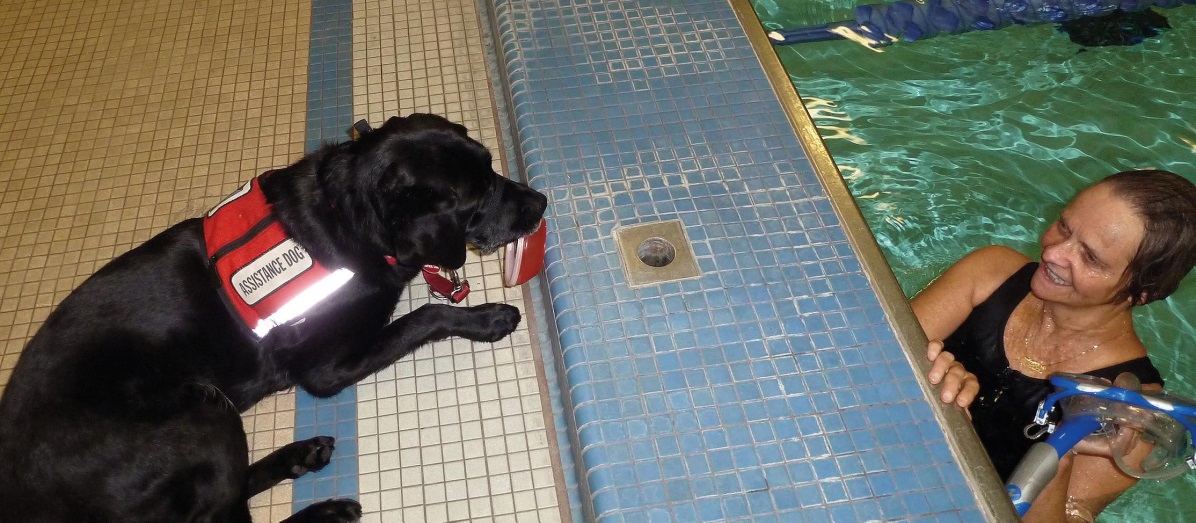So what are some of the many things a service dog can provide for a person upon command?
- Pick up dropped objects on the floor
- Collect the morning paper
- Tug open a refrigerator or other door with a rope
- Tug cabinets open
- Nudge a door closed
- Pick up food bowls
- Nudge a breathing machine located on the floor
- Carry your belongings in their working jacket pockets
- Carry an object to another person for you
- Watch you work out and be sure you are safe
- Travel at your feet on busses, trains, and planes
- Carry your tickets for the trip
- Be allowed to be by your side, even in a hospital
- Turn light switches on and off
- Retrieve objects from tables and counters
- Bark on command to alert others of your needed help
- Push automatic door buttons
- Retrieve the phone
- Provide the most amazing comfort and support one could ask for
If this is of interest to you, the next thing you need to decide is how you want to consider getting a dog. You can contact organizations that train and match those approved or you can train a dog on your own or with assistance.
COMMONLY ASKED QUESTIONS
Can You Train your own Dog? Under the ADA, people with disabilities have the right to train their own service animals and are not required to use a professional service dog training program. There is no legal service animal certification.
What is the definition of a Service Dog ? Under the ADA, a service animal is defined as a dog that has been individually trained to do work or perform tasks for an individual with a disability. The task performed by the dog must be related to the person's disability. The dog must be trained to take a specific action when needed to assist the person with a disability.1
HOW DOES MY DOG BECOME A SERVICE DOG?
- The first step is to know what the requirements and laws are for service dogs.
- Title II and Title III of the ADA define Service Animal as any dog that is trained to perform tasks for the benefit of a person with a disability. This may include physical, sensory, psychiatric, intellectual, or other emotional disability.
- Based on the ADA's ruling in 1990, dogs that provide a professional service to individuals with disabilities that require their support will be allowed access to public places when accompanying their handlers.
- This is not limited to seeing eye dogs as commonly believed!
WHAT ARE SERVICE DOG REQUIREMENTS?
Step 1: Identifying and Understanding What Type of Dog You Have: Any dog breed is suitable for service work! From Golden Retrievers, Labrador Retrievers, German Shepherds, Bully Breeds, Poodles, Huskies, etc. All types of dogs are eligible to become service dogs. Service dog laws do not include dog breed restrictions or weight discrimination. If you don't know the breed of your dog, you can aquire a simple dog DNA test that can provide you with higher accuracy of breed-related instincts. You should also be aware of your dog's health conditions to confirm that the age and health of your dog is suitable for the job and to prevent adding strains to a service animal's health and also to its handler's condition(s). It is also important to test your dog's personality type to see if he or she has a good temperament for service work. Dogs who are aggressive or easily scared may not work as service dogs until their public temperament improves.
Step 2: Find a Trainer You Trust or Train Your Dog Yourself! You can either adopt a trained service dog from a reputable trainer or bring your dog to a Trainer. Did you know that you can train your dog yourself under service dog laws? In the United States, there is no required ADA certification for service animal training. The community is self-regulated and includes minimum government-regulated standards for training. If you find that you would rather train your dog yourself, you are not only welcome to it, but it can also help increase the bond between you and your service dog.
ON DUTY: Maggie hands the author her ear plugs while monitoring her in the pool; "Maggie's loyalty to doing her chores on command and keeping me safe remained for over ten years until her passing."
